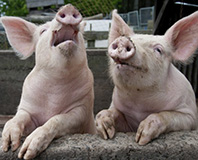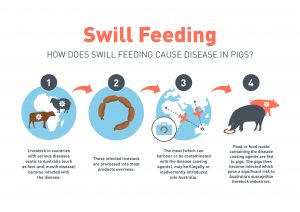Read the latest information on
Foot-and-mouth disease

Those in Australia’s food production and supply sector should be careful if they are supplying food waste for pig feed. Swill feeding is illegal, with significant penalties applying.
An open letter to all restaurateurs, chefs, hospitality workers and cooks – we need to talk about pigs and what they can and can’t eat.
We are calling on the support of those in the hospitality and food supply chain to carefully consider the leftover food stuffs that you may be providing to someone for pig feed.
By providing human food scraps to pigs you may inadvertently be providing swill which is dangerous and illegal. Swill is food waste containing, or having been in contact with meat. These food products may contain devastating exotic disease-causing organisms that cause diseases like foot-and-mouth-disease (FMD).
Australia has strict laws controlling collection, storage, treatment and disposal of food substances, therefore, being involved in a food business you need to know what food products are acceptable to supply to livestock owners as animal feed. At the very least you should be ensuring the food waste you may be providing has not been in contact with meat.
Whilst not common practice, it is known that food outlets such as bakeries, restaurants and catering companies do occasionally supply swill to pig owners looking for sustainable feed options. In 2014, the Victorian Department of Environment and Primary Industries surveyed 613 regional Victorian restaurants, hotels and food outlets. From this, 71 vendors supplied food waste to pig owners. Similarly, according to the Australian Veterinary Journal, in 2006 there were 148 swill-feeding inspections carried out across the nation, with nine warning letters issued to non-compliant producers and four producers facing severe penalties for feeding swill. The researchers also conducted interviews with 106 pig producers across eastern Australia and found that 19 per cent of small land holding farmers fed their pigs retail waste or table scraps.
These are sobering statistics, given that it only takes feeding one pig one tiny portion of contaminated meat or something that has been in contact with contaminated meat to start the spread of a disease like FMD. According to the Australian Bureau of Agricultural and Resource Economics and Sciences, FMD could cost Australia up to $50 billion over 10 years. For further information about the impacts FMD can have on a country you should read this eye-opening piece by the UK’s The Telegraphabout the impact of that country’s FMD outbreak in 2001.
So, before you hand over your food scraps, think about the bigger picture – that your scraps could lead to a $50 billion loss over a 10 year period if an FMD outbreak was to occur. And FMD doesn’t just affect pigs but all other ruminant animals (cows, sheep and goats) which means potentially a big supply shortage for your restaurant!
For more information about swill feeding and food recycling for pigs, download a free copy of A business guide to managing the biosecurity risks of food recycling in Australia.

Farm Biosecurity is a national awareness program that provides information to livestock and plant producers and related service providers about on-farm biosecurity, and prevention of animal diseases and plant pests. The program is a joint initiative of Animal Health Australia and Plant Health Australia. It encourages producers to identify risks to their livestock and plant products and minimise these risks by incorporating on-farm biosecurity measures into their everyday operations.